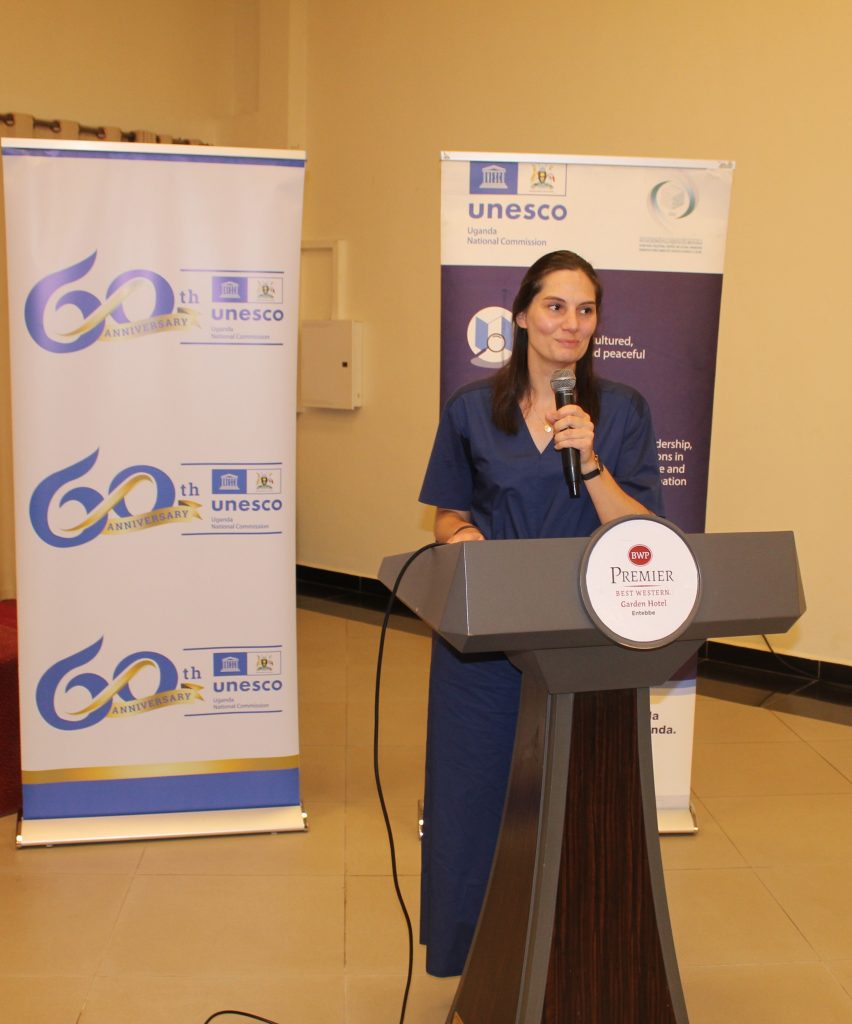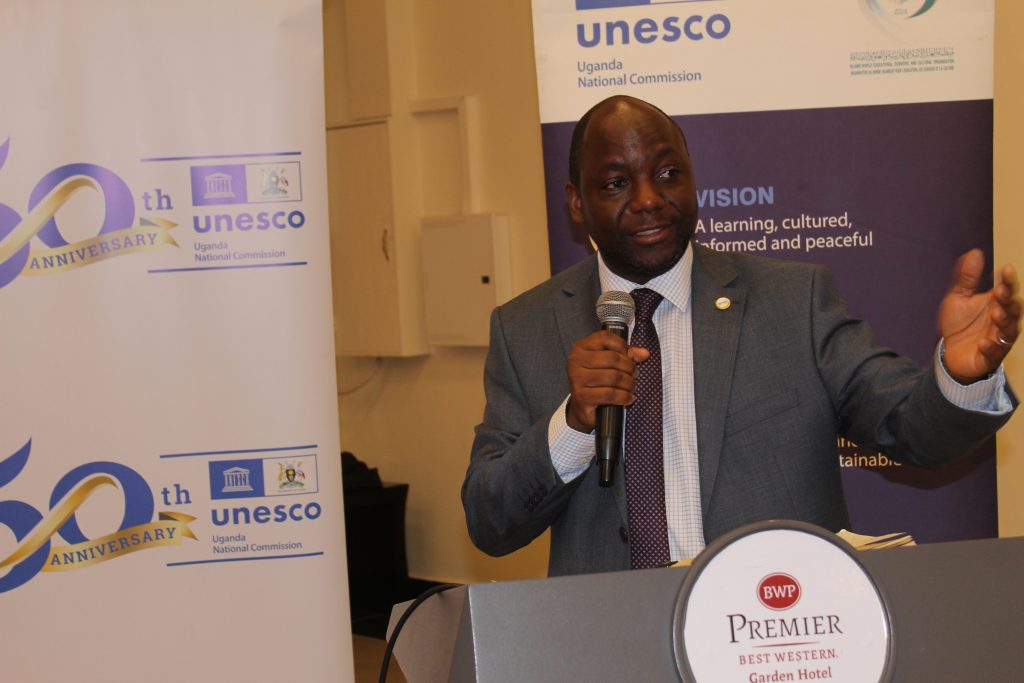The workshop was part of UNESCO’s Priority Africa initiative and aimed to strengthen cooperation between National Commissions for UNESCO (NATCOMs) from East African region. In the framework of priority Africa in UNESCO, the German Commission for UNESCO committed to support UNESCO to implement a programme to build capacity of National Commissions for UNESCO in Sub Sahara African countries.
At country level, National Commissions for UNESCO are UNESCO’s privileged partners for outreach, engagement and amplifying messages about UNESCO’s vision and mission. The Government of Uganda joins the rest of the World to celebrate these unique partnerships led by National Commissions for UNESCO by recalling some of the actions that UNESCO has accomplished with their support. These operations past or present, local, regional or global have each, in their own way, extended the scope of UNESCO’s activities in the fields covered by its mandate. Dr. Jane Egau representing Permanent Secretary MoES
The German Commission for UNESCO demonstrated its commitment to this endeavor by providing support for UNESCO’s program designed to enhance the capacity of National Commissions for UNESCO in Sub-Saharan African nations. Thanks to this support, UNATCOM (Uganda National Commission for UNESCO) took the initiative to organize and host a sub-regional capacity-building workshop exclusively for East African National Commissions for UNESCO. The central theme of this workshop revolved around “Regional Cooperation within the Context of UNESCO Programs and Strategy”. The workshop took place from Tuesday, 29th of August until Saturday, 2nd of September 2023 at Best Western Premier Garden Hotel in Entebbe, Uganda.

Group picture of participants with the chief guest
The primary objective of this workshop was to empower participants by enhancing their capacities, fostering valuable networking opportunities, and promoting the adoption of best practices among the East African National Commissions. Key highlights of the event included reflections on the Eastern African NATCOMs Meeting held in Tanzania, a comprehensive review of the Eastern African NATCOMs Meeting conducted in Ghana, and in-depth discussions on the Draft Programme and Budget 42 C/5 for the 42nd General Conference of UNESCO.
In her opening remarks Ms. Rosie Agoi, Secretary General, UNATCOM noted that since 2008, German National Commission for UNESCO has partnered with many NATCOM’s of Sub-Saharan Africa and the goals of the partnership have been to strengthen the global and regional network of NATCOM’s and to reinforce the role of individual NATCOM’s as effective catalysts of UNESCO’s action at country level.
The UNESCO National Commissions Secretaries-General and their Deputies of the five East African countries, namely Burundi, Kenya, Rwanda, Tanzania and Uganda, have undertaken training workshops within a Joint Capacity Building Project Framework funded by the German National Commission for UNESCO for several years. Some of these workshops have also been attended by the (National Commissions) NATCOMs in the wider Eastern Africa region in a bid to move as one block with similar interests under one regional office. These capacity-building workshops have significantly contributed to the increased effectiveness and efficiency of the National Commissions in the region and at the country level- Ms. RosieAgoi, SG, UNATCOM
Since 2008, German National Commission has partnered with some NATCOM’s of Sub-Saharan Africa. The goals of the partnership have been to strengthen the global and regional network of NATCOM’s and to reinforce the role of individual NATCOM’s as effective catalysts of UNESCO’s action at country level. A joint roadmap (“Bonn Roadmap 2008”) was developed, in close collaboration with UNESCO as a development for the partnership. Five pillars of cooperation agreed upon in 2008 were: institutional capacity building through training workshops, exchange of staff and south-south co-operation within the respective cluster regions; training of individual staff members in key competencies, sharing of strategic and technical knowhow; visits of experts; and field projects.
German National Commission for UNESCO is a strong supporter of the East African NATCOMs Network, it has been supporting it for 15 years, happy that after the Covid Pandemic and its disruptions we have continued to partner and organize such kind of capacity building workshops. One wonders why German National Commission for UNESCO supports such initiatives, we believe that stronger NATCOM’s are central to achieving the SDGs and the mission of UNESCO in the long run.- Ms. Jeannine Hausmann, German National Commission for UNESCO
Ms.Jeannine Hausmann from German National Commission for UNESCO during the opening session
During the workshop, a pivotal message resonated strongly: East African member states must actively pursue membership on the Executive Board and various UNESCO Committees. These platforms serve as critical decision-making arenas where major determinations concerning the implementation of UNESCO Programs in member states are forged. The robustness of Permanent Delegations was underscored as a key factor in making a substantive impact. Notably, countries with dedicated Permanent Delegations, distinct from embassy staff have demonstrated more significant progress in reaping the benefits of UNESCO’s interventions.
National Commissions for UNESCO in attendance received a resounding call to action: to advocate with their respective governments for the appointment of stronger Permanent Delegations to UNESCO. This advocacy was seen as essential for maximizing the advantages derived from UNESCO’s Programs and Interventions.
Another focal point of discussion revolved around the Operational Strategy for Priority Africa 2022-2029 and its five Flagship Programmes:
- Campus Africa: Strengthening Higher Education in Africa (Education)
- The General History of Africa (GHA) as a Catalyst for Achieving Agenda 2063 and the 2030 Agenda (Education-Social and Human Sciences-Culture)
- Fostering Cultural Heritage and Capacity Development (Culture)
- Harnessing New and Emerging Technologies for Sustainable Development in Africa, including through the Implementation of the Recommendation on the Ethics of Artificial Intelligence (Science and Humanities for Sustainable Development-Social and Human Sciences-Culture-Communication and Information)
- Enhancing Open Science, Reinforcing Capacity Building in Basic and Applied Sciences, and Advancing Scientific Research for Strengthening Innovation and Technology Development in Ocean Science, Climate Change Resilience, and Water Resource Management in Africa (Science-IOC)
A unanimous resolution was reached: East African National Commissions should diligently work towards integrating this strategy into their National Development Plans. This integration is viewed as a pivotal step to ensure the successful and effective implementation of the Strategy, ultimately advancing UNESCO’s objectives and enhancing Africa’s development course.
“National Commissions for UNESCO are unique in UN system, we need to engage more and capitalize on this uniqueness to help in an effective way to make UNESCO’s objectives better known, broaden its range of influence and promote the execution of its programme, by involving the intellectual and scientific communities of their respective countries in this work especially in the East African Region” –Mr. Huge Ngandeu Ngatta, UNESCO Regional Office
Mr. Huge Ngandeu Ngatta, from UNESCO Regional Office addressing participants
Participants included; Secretary Generals and Assistant Secretary Generals) from 7 East African NATCOMs (Burundi, Kenya, Rwanda, Tanzania, Uganda, Madagascar and Mauritius), Programme Officers from UNATCOM, Officials from of German National Commission and UNESCO Eastern Africa Regional Office.



